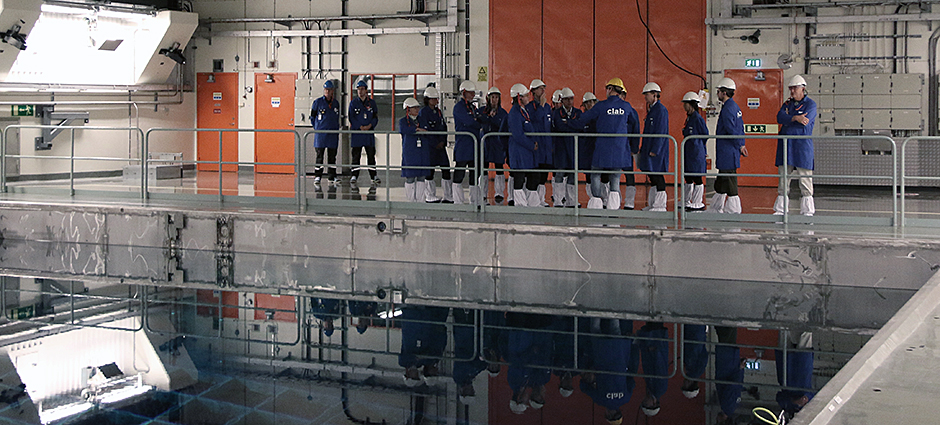This text is older than 7 years old and could contain inactive information.
A week in Oskarshamn with inspections
About 70 people were present at Forum in Oskarshamn when the third week of the main hearing began on Monday afternoon. SKB, the Swedish Radiation Safety Authority and other regulatory authorities, the municipalities, environmental organisations and both local newspapers were represented.
A large part of the afternoon was devoted to formalities concerning the hearing and basic clarification of how the licensing process will be conducted. The court asked a number of questions to the parties, SKB and the Swedish Radiation Safety Authority (SSM), which it wants answered during the final week of the hearing. SKB’s representative presented all demands, with a special focus on the demands linked to Clab/Clink, and described the KBS-3 system and the facilities included in the licensing.
On Tuesday, SKB gave an account of the operations at Clab and Clink and the environmental impact statement for interim storage and encapsulation of spent nuclear fuel. Thereafter, SKB’s representative presented a proposal for conditions and obligations for the operations at Clab/Clink.
Other parties were then given the opportunity to comment on SKB’s account. Those who did not attend the hearing in Stockholm could comment on the entire application.
The municipality wants clarification
Oskarshamn Municipality presented its views on SKB’s proposal for conditions and believes that some clarification is needed and that the conditions should be as clear as possible before the municipality issues a statement to the Government. The municipality concluded with clarifying that Clab is an interim storage facility and the municipality is eager to achieve a solution for final disposal of the spent nuclear fuel.
SSM described how their review of SKB’s application was carried out and stated that the review shows that SKB has the potential to meet the requirements linked to each demand in the application under the Nuclear Activities Act. For increased storage capacity in Clab, design and construction of the encapsulation plant and a combination of the two parts to form Clink. Therefore, they approve of the application under the Environmental Code. They reminded of the stepwise licensing process that will take place after the Government has granted permissibility under the Nuclear Activities Act. They stated that SKB needs to provide more detailed plans in future stages. SSM also commented on SKB’s conditions.
Milkas repeated that they disapprove of SKB’s application. MKG/the Swedish Society for Nature Conservation emphasised that Clab has a long life-time and that prolonged interim storage in Clab does not cause risks to human health and the environment. If Clab should not be sufficient, MKG believes that it is possible for SKB to use dry interim storage. Therefore, MKG believes that it is not urgent to provide a licence for a final repository system and reminded the court that it disapproves of the application. Sero also advocates dry interim storage.
The County Administrative Board in Kalmar submitted a new written statement with some legal views on the conditions.
Facility visits
On Wednesday and Thursday, an inspection was carried out at SKB’s facilities in Oskarshamn. The Land and Environment Court along with representatives from SSM, the municipality, the County Administrative Board and the environmental organisations started the inspection with a visit to Clab, where they could see how transport casks are received in the facility and then cooled down and how the fuel assemblies are reloaded into storage canisters, which are then lowered down into the storage pools. Thereafter, the site where the encapsulation plant will be built was shown and how SKB intends to solve the handling of surface water for Clab/Clink.
During the visit to the Äspö HRL, SKB talked about the rock as a barrier and the Äspö rock in relation to the rock in Forsmark. The deposition machine and deposition holes were demonstrated, as well as a number of experiments. The Bentonite Laboratory was visited above ground. In the Canister Laboratory, information was provided on canister fabrication, the welding method (Friction stir welding) and destructive and non-destructive testing.
Thereafter, the hearing continued with a summary of all inspections. SKB presented answers to all questions that were asked during the inspections on request of the court, since it is important that questions relevant to the licensing are asked so that all participants in the inspection can hear the question and benefit from the answer.
The week was concluded with a short reply concerning the issues of conditions, SKB will return to them during the final week in Stockholm.
News
SKB signs collaboration agreement for the Spent Fuel Repository
Published: 18 June 2025
Drones streamline inspections and patrols at SFR
Published: 17 June 2025
Blasting starts on the SFR extension in Forsmark
Published: 23 January 2025
Construction begins on Swedish Spent Fuel Repository
Published: 15 January 2025
SKB to weld canisters for world’s first final repository
Published: 16 December 2024
